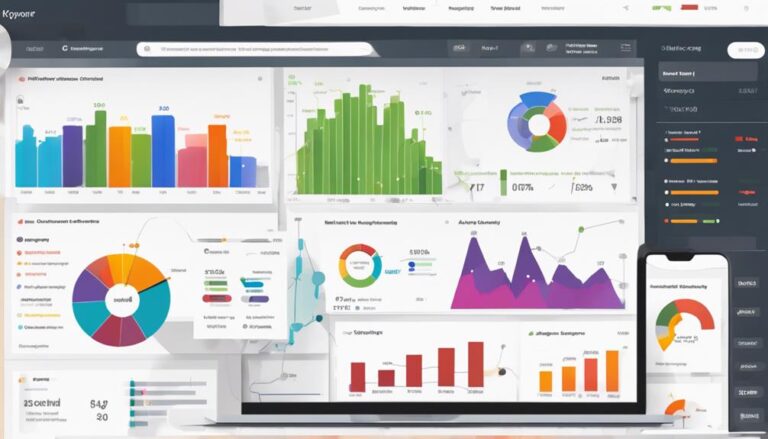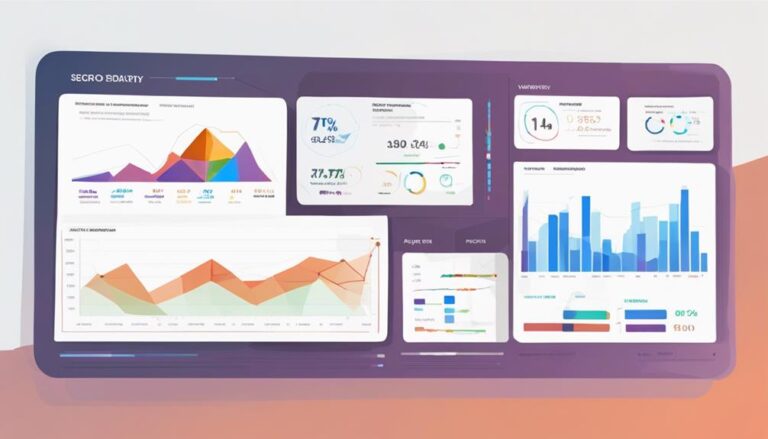
In the fast-paced digital landscape, staying ahead of the curve with your SEO efforts can be akin to navigating uncharted waters. As you embark on the journey of optimizing your online presence, understanding the nuances of comprehensive SEO campaign performance monitoring is crucial.
From deciphering complex algorithms to decoding user behavior patterns, each element plays a pivotal role in shaping your digital footprint. By uncovering actionable insights and implementing strategic tweaks, you can steer your SEO campaigns towards unprecedented success.
Key Takeaways
- Utilize KPIs and Google Analytics for real-time SEO monitoring.
- Refine content strategy based on organic search traffic insights.
- Assess backlink quality and conduct competitor analysis for SEO success.
- Optimize meta descriptions and monitor for enhanced search engine visibility.
Key Performance Indicators (KPIs)
To effectively measure the success of your SEO campaign, it's crucial to focus on Key Performance Indicators (KPIs) that provide quantifiable insights into your website's performance and search engine visibility. KPIs in SEO play a pivotal role in evaluating the impact of your strategies.
By tracking metrics like keyword rankings, organic search traffic, conversions, and competitor analysis, you can gauge the effectiveness of your efforts. Google Analytics and other tracking tools are instrumental in monitoring these KPIs in real-time.
Understanding how your website ranks for target keywords, the amount of organic traffic it attracts, and the conversion rates it achieves are all essential KPIs to consider. These metrics not only reflect your SEO performance but also help in aligning your tactics with your business objectives.
Organic Search Traffic Analysis
Analyzing organic search traffic provides valuable insights into user behavior, keyword effectiveness, and overall website performance. By utilizing tools like the Google Analytics dashboard, you can delve into organic traffic sources, identify the keywords driving traffic, and measure user engagement metrics. Monitoring organic search traffic is essential for optimizing your SEO Campaign, refining Keyword Research efforts, and enhancing overall SEO strategy. This data-driven approach allows you to make informed decisions to boost SEO Performance and improve website visibility.
Organic Search Traffic Analysis Table:
| Insights | Actions |
|---|---|
| User behavior patterns | Refine content strategy |
| High-performing keywords | Optimize for those keywords |
| Traffic sources | Focus on top referring sites |
| User engagement metrics | Enhance website experience |
| Seasonal trends | Adjust SEO strategy |
Conversion Rate Tracking
Upon analyzing organic search traffic, your next focus should be on tracking conversion rates to understand how effectively your website converts visitors into leads or customers.
Conversion rate tracking is essential as it measures the percentage of website visitors who complete desired actions, providing valuable insights for optimizing marketing strategies. Utilizing tools like Google Analytics is crucial for monitoring and improving conversion rates over time.
By setting up goals within Google Analytics, you can track the performance of your website in converting visitors into leads or customers, allowing you to make data-driven decisions for enhancing user experience and achieving business objectives.
Optimizing conversion rates is a key component of maximizing the impact of SEO campaigns, ensuring that your efforts result in tangible outcomes and a positive return on investment.
Therefore, continuously monitoring and analyzing conversion rates is vital for the success of your online presence and overall digital marketing strategy.
Backlink Quality Assessment
Assessing the quality of backlinks is a critical factor in determining the success of your SEO strategy, as high-quality backlinks from authoritative sources significantly impact website credibility. To ensure your backlink profile is strong and beneficial for SEO, consider the following key points:
- Evaluate Domain Authority: Focus on acquiring backlinks from websites with high domain authority to enhance the credibility and trustworthiness of your own site.
- Assess Anchor Text Diversity: Aim for a diverse range of anchor texts to signal to search engines that your backlink profile is natural and not manipulated.
- Identify Toxic Backlinks: Regularly monitor your backlink profile for toxic or spammy backlinks that could harm your SEO efforts.
- Maintain a Healthy Link Profile: Keep track of your backlink growth and ensure it aligns with your overall SEO strategy.
- Utilize Tools for Analysis: Leverage tools like Ahrefs, Moz, or SEMrush to delve deeper into your backlink profile, identify areas for improvement, and track progress over time.
Competitor Analysis Insights
Analyzing your competitors' backlink profiles allows you to pinpoint valuable backlink opportunities that can enhance your site's authority and ranking.
Monitoring their keyword rankings helps you identify lucrative target keywords to boost your SEO performance and visibility.
Studying their content strategies equips you with insights to create more engaging and relevant content that resonates with your audience.
Key Competitor Strategies
To gain a competitive edge in SEO campaigns, it's essential to delve into your competitors' keyword rankings, backlink profiles, and content strategies for valuable insights. Understanding your competitors' strategies can provide you with a roadmap for success.
Here are key competitor strategies to consider:
- Analyze competitor keyword rankings for opportunities and threats.
- Track competitors' backlink profiles to improve your link-building strategies.
- Monitor competitors' content strategies to enhance your own.
- Evaluate engagement metrics to stay competitive in the market.
- Utilize tools like SEMrush or Ahrefs for comprehensive competitor analysis.
Performance Comparison Metrics
Comparing performance metrics with your competitors provides valuable insights into the effectiveness of your SEO campaigns and highlights areas for strategic enhancement. By analyzing competitor keyword rankings, you can identify opportunities to refine your SEO strategies.
Assessing organic search traffic trends relative to your competitors helps gauge the impact of your campaigns. Evaluating competitor conversion rates allows you to benchmark your performance and optimize your conversion strategy accordingly.
Monitoring competitor backlink profiles offers insights into their off-page SEO efforts, aiding you in enhancing your own link-building strategy. Leveraging tools like SEMrush or Ahrefs for competitive analysis is crucial to staying ahead in the SEO game and adapting your performance based on data-driven insights.
On-Page SEO Evaluation
Evaluate your title tag optimization, meta description analysis, and content quality assessment to ensure your on-page SEO is on point.
These factors play a critical role in search engine visibility and user engagement.
Title Tag Optimization
Crafting optimized title tags for your webpages is crucial for enhancing search engine visibility and click-through rates. When focusing on Title Tag Optimization, consider these key points:
- Title tags are essential HTML elements that impact keyword ranking.
- Optimizing title tags can boost click-through rates in search engine results.
- Keeping title tags within 50-60 characters ensures full visibility.
- Placing the main keyword early in the title tag enhances SEO performance.
- Compelling and descriptive title tags entice users to click, increasing organic traffic.
Meta Description Analysis
Optimizing meta descriptions is a critical component of on-page SEO evaluation, directly influencing click-through rates and organic traffic. By analyzing meta descriptions through tools like Google Search Console and Site Audit, you can measure SEO success using key performance indicators such as Average CTR.
Evaluating meta descriptions of your top-performing pages is essential to ensure they entice users to click through. A well-crafted meta description can significantly impact your ranking on the first page of search results.
Regular meta description analysis allows you to fine-tune these snippets with relevant keywords, enhancing search engine understanding and increasing visibility. Monitoring and optimizing meta descriptions are vital steps in improving your website's overall search performance.
Content Quality Assessment
To enhance your SEO campaign performance, delve into assessing the quality of your content through a meticulous evaluation of its relevance, uniqueness, and optimization for target keywords. When conducting a content quality assessment for on-page SEO evaluation, consider the following:
- Check for uniqueness and originality in your content.
- Ensure readability and user engagement are optimized.
- Analyze structured data schema to enhance search engine understanding.
- Monitor performance data to make data-driven optimization decisions.
- Regularly update and optimize content based on insights gathered.
Technical SEO Auditing
When conducting a technical SEO audit, focus on identifying and resolving crawl and link issues that impact your website's search engine ranking.
A thorough technical audit is essential for addressing any new technical problems promptly, thus improving your SEO success.
It's crucial to optimize site speed and ensure mobile-friendliness as these aspects greatly influence website performance.
Continuous monitoring of your website for technical issues is vital to maintaining a healthy online presence.
By promptly fixing any crawl or link issues that arise, you contribute to sustained SEO success and enhance your website's overall performance.
Remember, a well-executed technical SEO audit not only boosts your search engine ranking but also provides visitors with a seamless browsing experience.
Stay proactive in addressing technical challenges to stay ahead in the digital landscape and achieve your SEO goals efficiently.
Mobile Responsiveness Assessment
Assessing mobile responsiveness is critical for optimizing website performance and enhancing user experience in today's digital landscape. With mobile devices driving 52% of global web traffic, prioritizing mobile responsiveness is key for SEO success. To ensure your site meets mobile standards, utilize tools like Google's Mobile-Friendly Test.
Here are five crucial factors to focus on:
- Fast Load Times: Optimize your site for quick loading on mobile devices to prevent user frustration and high bounce rates.
- Optimized Content: Tailor your content for mobile users, ensuring readability and engagement on smaller screens.
- Seamless Navigation: Make it easy for mobile visitors to find information by providing intuitive navigation menus and clear pathways.
- User Experience: Enhance user experience by prioritizing mobile responsiveness, leading to higher user satisfaction and increased conversions.
- Boosting Conversions: A mobile-friendly site can significantly impact conversion rates, making it a valuable investment for your business.
Reporting and Data Visualization
Mobile responsiveness assessment is crucial for optimizing website performance, and when it comes to monitoring your SEO campaign, the focus shifts to reporting and data visualization. Data visualization tools like Google Data Studio and Tableau play a vital role in creating visually appealing reports that highlight key metrics such as organic traffic, keyword rankings, and conversion rates. Dashboards are essential for easy analysis, providing stakeholders with a quick overview of campaign performance. By incorporating interactive elements into reports, stakeholders can delve deeper into the data, gaining valuable insights into the effectiveness of the SEO efforts. Customizing reports based on client preferences and key performance indicators (KPIs) enhances communication and showcases the impact of the campaign. Regularly updating and sharing these customized reports with stakeholders fosters transparency and ensures alignment on the progress and results of the SEO campaign.
| Benefits of Data Visualization Tools | |
|---|---|
| – Creates visually appealing reports | |
| – Displays key metrics effectively | |
| – Allows for interactive exploration | |
| – Enhances communication with stakeholders |
Conclusion
In conclusion, by diligently monitoring key performance indicators and analyzing data-driven insights, you can steer your SEO campaign towards success. Just like a compass guides a ship through turbulent waters, tracking metrics will navigate your online presence towards higher rankings and increased visibility.
Stay focused on your goals, adapt to changes, and watch your efforts yield fruitful results in the ever-evolving digital landscape. Keep optimizing, keep growing.


